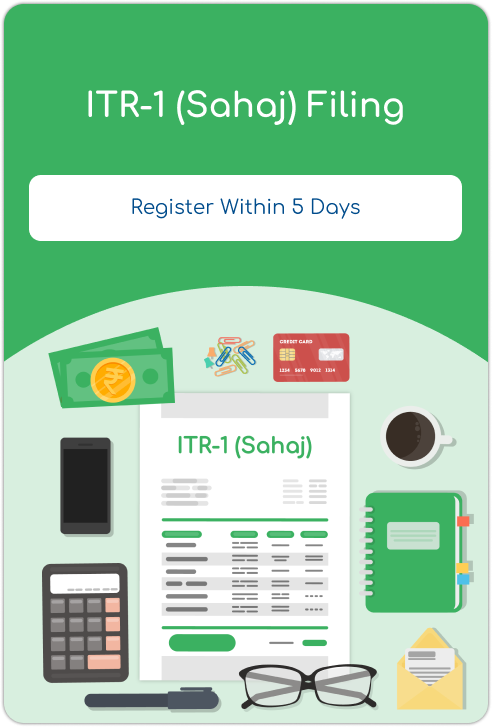
ITR-1 Filing
8533 customers
What will you get?
- Access of Android
- Access of Web Application
- Income Tax Return Filing
- Tax Notices advice
- Financial Planning
- Income Tax Audit
What do we Require?
INR 0 Taxes As Applicable









Introduction
The Income Tax Return Form 1, commonly known as ITR-1 or Sahaj, is a vital document in the realm of taxation in India. It serves as a fundamental tool for individual taxpayers to declare their income and taxes to the government. Designed to be comprehensive yet accessible, ITR-1 caters to salaried individuals, pensioners, and those with income from a single house property or other sources like interest or dividends. Its user-friendly format simplifies the often intricate process of tax filing, empowering taxpayers to fulfil their fiscal obligations efficiently and accurately. In this introduction, we delve into the significance, structure, and key features of ITR-1, shedding light on its role in the Indian tax landscape. ProMunim is committed to simplifying tax compliance for individuals, and one of the core services we offer is assistance with filing ITR-1. Our experienced team understands the nuances of tax regulations and is dedicated to guiding clients through the process seamlessly. With Promunim, you can trust that your ITR-1 filing will be accurate, timely, and compliant with the latest tax laws. We prioritize transparency and clarity, ensuring that clients have a clear understanding of their tax obligations and options for optimization. Whether you're a salaried individual, pensioner, or someone with income from other sources, Promunim is here to streamline your tax filing experience and help you achieve peace of mind regarding your financial affairs.
Eligibility:
Eligibility for filing ITR-1 (Sahaj) is determined by certain criteria set by the Income Tax Department of India. Here are the key eligibility requirements:
- Salary or pension income.
- Income from one house property (excluding cases where loss is brought forward from previous years).
- Income from other sources like interest income, family pension, etc. where the income does not exceed Rs. 50 lakhs.
- The total income of the individual should not exceed Rs. 50 lakhs.
- More than one house property.
- Income from business or profession.
- Capital gains income (e.g., from the sale of property, shares, mutual funds, etc.).
- Agricultural income exceeding Rs. 5,000.
- The taxpayer should not be a director in a company or have invested in unlisted equity shares.
Documents Requirement:
- PAN Card:Your Permanent Account Number (PAN) card is essential for filing your tax return.
- Form 16:If you're a salaried individual, you'll need Form 16, which is provided by your employer. It contains details of your salary income, taxes deducted at source (TDS), and any other allowances or perquisites.
- Bank Statements:Gather bank statements for all your savings and current accounts to report interest income accurately. This includes interest earned from fixed deposits, savings accounts, recurring deposits, etc.
- TDS Certificates:Collect TDS certificates issued by deductors such as employers, banks, or others. These certificates provide details of tax deducted at source on your income.
- Details of Income from House Property:If you have income from a single house property, gather details such as rental income, municipal taxes paid, and interest paid on home loans (if any).
- Section 80C (e.g., Provident Fund contributions, Life Insurance Premiums, Equity Linked Savings Schemes, etc.).
- Section 80D (Health Insurance Premiums).
- Section 80TTA (Interest on Savings Account).
- Section 80G (Donations made to eligible charitable institutions).
- Details of Other Income:If you have income from sources other than salary and house property, such as interest income, dividends, or pension, gather relevant documents supporting these incomes.
- Aadhaar Card:While not mandatory, having your Aadhaar card can simplify the filing process as it can be used for identity verification.
- Details of Previous Year's Tax Return (if applicable):If you filed an income tax return in the previous year, keep a copy of it for reference.
- Bank Account Details:IProvide accurate bank account details for receiving any tax refunds.
Due date for ITR 1 filing:
For Individuals (other than Companies) and HUFs (whose accounts are not required to be audited): the due date for filing ITR 1 is generally July 31st of the assessment year. For Individuals and HUFs (having income from business or profession) whose accounts are required to be audited: the due date for filing ITR 1 is typically September 30th of the assessment year. However, it's essential to check for any changes in the due dates announced by the Income Tax Department.
Late Filing ITR-1 (Sahaj):
- Late Filing Fee:If you miss the deadline for filing your ITR, you may have to pay a late filing fee under Section 234F of the Income Tax Act, 1961. The late filing fee is as follows: If the return is filed after the due date but on or before December 31 of the assessment year, a late fee of up to Rs. 5,000 may apply. If the return is filed after December 31 of the assessment year, a late fee of up to Rs. 10,000 may apply. For Small Taxpayers: If your total income does not exceed Rs. 5 lakhs, the maximum late filing fee is capped at Rs. 1,000.
- Interest on Delayed Payment of Taxes:In addition to the late filing fee, if you have any tax dues pending, interest under Section 234A, 234B, and 234C may apply on the outstanding amount. This interest is calculated from the due date of filing the return to the actual date of filing.
- Other Consequences:Apart from the financial penalties, late filing of ITR can also lead to other consequences such as loss of certain deductions, restrictions on carry forward of losses, and difficulties in obtaining loans or visas.
Benefits of Deduction:
Availing deductions while filing Income Tax Return (ITR) using Form ITR-1 (Sahaj) offers numerous benefits for taxpayers. These deductions serve as valuable tools to reduce taxable income, thereby lowering the overall tax liability and enhancing tax efficiency. By investing in specified instruments under Section 80C, such as Employee Provident Fund (EPF), Public Provident Fund (PPF), and Equity Linked Savings Schemes (ELSS), individuals not only secure their financial future but also enjoy tax benefits. Similarly, deductions under Section 80D for health insurance premiums ensure both healthcare coverage and tax savings. Interest payments on home loans for self- occupied or let-out properties, eligible for deduction under Section 24, incentivize homeownership and investment in real estate. Additionally, deductions for education loans (Section 80E) and donations to charitable organizations (Section 80G) encourage investment in education and philanthropy while reducing taxable income. Overall, leveraging these deductions not only fosters prudent financial planning but also aligns with the government's objective of promoting savings, investments, and social welfare initiatives.

